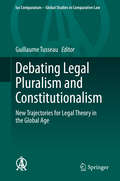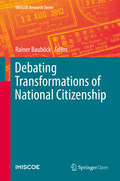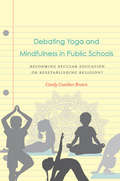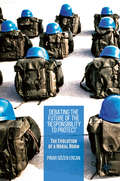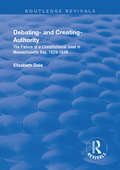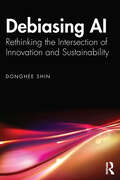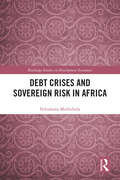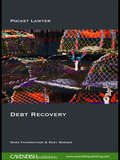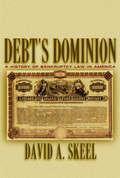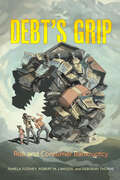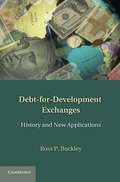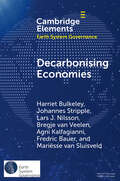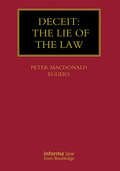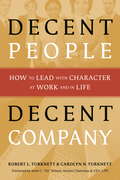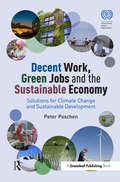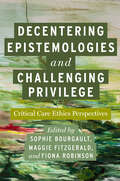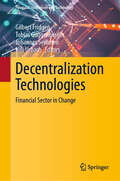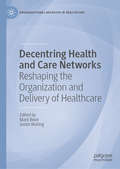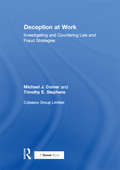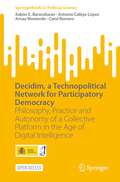- Table View
- List View
Debating Legal Pluralism and Constitutionalism: New Trajectories for Legal Theory in the Global Age (Ius Comparatum - Global Studies in Comparative Law #41)
by Guillaume TusseauThe book gathers the general report and the national reports presented at the XXth General Congress of the IACL, in Fukuoka (Japan), on the topic “Debating legal pluralism and constitutionalism: new trajectories for legal theory in the global age”. Discussing the major contemporary changes occurring in and problems faced by domestic legal systems in the global age, the book describes how and to what extent these trends affect domestic legal orderings and practices, and challenges the traditional theoretical lenses that are offered to tackle them: constitutionalism and pluralism. Combining comparative law and comparative legal doctrine, and drawing on the national contributions, the general report concludes that most of the classic tools offered by legal doctrine are not appropriate to address most of today’s practical and theoretical global legal challenges, and as such, the book also offers new intellectual tools for the global age.
Debating Sharia
by Jennifer Selby Anna KortewegWhen the Islamic Institute of Civil Justice announced it would begin offering Sharia-based services in Ontario, a subsequent provincial government review gave qualified support for religious arbitration. However, the ensuing debate inflamed the passions of a wide range of Muslim and non-Muslim groups, garnered worldwide attention, and led to a ban on religiously based family law arbitration in the province. Debating Sharia sheds light on how Ontario's Sharia debate of 2003-2006 exemplified contemporary concerns regarding religiosity in the public sphere and the place of Islam in Western nation states.Focusing on the legal ramifications of Sharia law in the context of rapidly changing Western liberal democracies, Debating Sharia approaches the issue from a variety of methodological perspectives, including policy and media analysis, fieldwork, feminist examinations of the portrayals of Muslim women, and theoretical examinations of religion, Sharia, and the law. This volume is an important read for those who grapple with ethnic and religio-cultural diversity while remaining committed to religious freedom and women's equality.
Debating Transformations of National Citizenship (IMISCOE Research Series)
by Rainer BauböckThis open access book discusses how national citizenship is being transformed by economic, social and political change. It focuses on the emergence of global markets where citizenship is for sale and on how new reproduction technologies impact citizenship by descent. It also discusses the return of banishment through denationalisation of terrorist suspects, and the impact of digital technologies, such as blockchain, on the future of democratic citizenship. The book provides a wide range of views on these issues from legal scholars, political scientists, and political practitioners. It is structured as a series of four conversations in which authors respond to each other. This exchange of arguments provides unique depth to current debates about the future of citizenship.
Debating Yoga and Mindfulness in Public Schools: Reforming Secular Education or Reestablishing Religion?
by Candy Gunther BrownYoga and mindfulness activities, with roots in Asian traditions such as Hinduism or Buddhism, have been brought into growing numbers of public schools since the 1970s. While they are commonly assumed to be secular educational tools, Candy Gunther Brown asks whether religion is truly left out of the equation in the context of public-school curricula. An expert witness in four legal challenges, Brown scrutinized unpublished trial records, informant interviews, and legal precedents, as well as insider documents, some revealing promoters of "Vedic victory" or "stealth Buddhism" for public-school children. The legal challenges are fruitful cases for Brown's analysis of the concepts of religious and secular.While notions of what makes something religious or secular are crucial to those who study religion, they have special significance in the realm of public and legal norms. They affect how people experience their lives, raise their children, and navigate educational systems. The question of religion in public education, Brown shows, is no longer a matter of jurisprudence focused largely on the establishment of a Protestant Bible or nonsectarian prayer. Instead, it now reflects an increasingly diverse American religious landscape. Reconceptualizing secularization as transparency and religious voluntarism, Brown argues for an opt-in model for public-school programs.
Debating the Ethics of Immigration: Is There A Right to Exclude?
by Christopher Heath Wellman Phillip ColeDo states have the right to prevent potential immigrants from crossing their borders, or should people have the freedom to migrate and settle wherever they wish? Christopher Heath Wellman and Phillip Cole develop and defend opposing answers to this timely and important question. Appealing to the right to freedom of association, Wellman contends that legitimate states have broad discretion to exclude potential immigrants, even those who desperately seek to enter. Against this, Cole argues that the commitment to the moral equality of all human beings - which legitimate states can be expected to hold - means national borders must be open: equal respect requires equal access, both to territory and membership; and that the idea of open borders is less radical than it seems when we consider how many territorial and community boundaries have this open nature. In addition to engaging with each other's arguments, Wellman and Cole address a range of central questions and prominent positions on this topic. The authors therefore provide a critical overview of the major contributions to the ethics of migration, as well as developing original, provocative positions of their own.
Debating the Future of the 'Responsibility to Protect'
by Pınar Gözen ErcanThis book examines the relevance of the Responsibility to Protect (R2P) in responding to humanitarian challenges across the world. While arguing that R2P has evolved into an international moral norm, Ercan concludes that R2P cannot lead to a positive change in the international system without being equipped with new powers.
Debating – and Creating – Authority: The Failure of a Constitutional Ideal in Massachusetts Bay, 1629-1649 (Law, Justice And Power Ser.)
by Elizabeth DaleThis title was first published in 2001. In the tight frame of its first twenty years, Massachusetts Bay dramatically altered its constitutional order from a theocracy to an oligarchy, led by magistrates who created their own authority and defined the limits on their almost unlimited power. Debating-and Creating-Authority examines this shift in constitutional order at various levels and looks in particular at the efforts to create the theocracy and its subsequent collapse in terms of a fundamental democratical flaw at the centre of the theocratic ideal.
Debiasing AI: Rethinking the Intersection of Innovation and Sustainability
by Donghee ShinIn an era where artificial intelligence (AI) drives unprecedented change, Debiasing AI examines the vital intersection of technology, innovation, and sustainability. This book confronts the pressing challenge of bias in AI systems, exploring its far-reaching implications for fairness, trust, and ethical practices. Through a multidisciplinary lens, the author examines how human biases are embedded in large language models, amplified by coded machine learning, and propagated through trained algorithms. Practical strategies are offered to address these issues, paving the way for the development of more equitable and inclusive AI technologies.With actionable insights, empirical case studies, and theoretical frameworks, Debiasing AI offers a roadmap for designing AI technologies that are not only innovative but also ethically sound and equitable. A must-read for scholars, industry leaders, and policymakers, this book inspires a reimagining of AI’s role in creating a fairer and more sustainable future.
Debt Crises and Sovereign Risk in Africa (Routledge Studies in Development Economics)
by Ndzalama MathebulaThis book examines the resurgence of debt crises in Africa following the Covid-19 pandemic. It deciphers the debt crisis phenomenon through the discourse of sovereign risk, which has been paid insufficient attention within the African context. It seeks to appreciate facets that continue to lead African states to a debt-default position.The book focuses on the pre-stages of default and debt default risks. It explores and investigates whether South Africa was and continues to be financially capable of servicing its International Monetary Fund (IMF) loan, granted in 2020 for the COVID-19 pandemic. While investigating how and why Ethiopia and Ghana have already defaulted on their post-pandemic loans from the IMF. It examines the idea of sovereign risk in Africa through a qualitative methodology and a case study research design, analyzing three countries borrowed from the IMF in 2020 or later, mainly prompted by the pandemic. The book distinguishes between African states that have not yet defaulted and those that have already defaulted on their debt servicing. Namely, South Africa, Ethiopia, and Ghana, two of which have already defaulted on their loan. The book also notes the resurgence of the IMF within the African continent while assessing the past narrative and impact of the international monetary system and how it has changed in the post-pandemic era. However, economic diversification has been noted as a prominent remedy that holds the potential of strengthening African economies and aiding their eradication of the debt crisis.The book is designed to appeal to numerous reading communities, namely scholars, researchers, advanced students and policymakers.
Debt Recovery
by Mark Fairweather Rosy BorderFirst published in 2003. Routledge is an imprint of Taylor & Francis, an informa company.
Debt's Dominion: A History of Bankruptcy Law in America
by David A. SkeelBankruptcy in America, in stark contrast to its status in most other countries, typically signifies not a debtor's last gasp but an opportunity to catch one's breath and recoup. Why has the nation's legal system evolved to allow both corporate and individual debtors greater control over their fate than imaginable elsewhere? Masterfully probing the political dynamics behind this question, David Skeel here provides the first complete account of the remarkable journey American bankruptcy law has taken from its beginnings in 1800, when Congress lifted the country's first bankruptcy code right out of English law, to the present day. Skeel shows that the confluence of three forces that emerged over many years--an organized creditor lobby, pro-debtor ideological currents, and an increasingly powerful bankruptcy bar--explains the distinctive contours of American bankruptcy law. Their interplay, he argues in clear, inviting prose, has seen efforts to legislate bankruptcy become a compelling battle royale between bankers and lawyers--one in which the bankers recently seem to have gained the upper hand. Skeel demonstrates, for example, that a fiercely divided bankruptcy commission and the 1994 Republican takeover of Congress have yielded the recent, ideologically charged battles over consumer bankruptcy. The uniqueness of American bankruptcy has often been noted, but it has never been explained. As different as twenty-first century America is from the horse-and-buggy era origins of our bankruptcy laws, Skeel shows that the same political factors continue to shape our unique response to financial distress.
Debt's Grip: Risk and Consumer Bankruptcy
by Pamela FooheyDebt’s Grip tells the story of financial struggle in the United States. Drawing on original data from the Consumer Bankruptcy Project, a landmark long-term study, the authors use the words of bankruptcy filers themselves to shed light on their battles to keep their homes and their cars, pay for healthcare and higher education, care for their children, find adequate employment, retire, negotiate with debt collectors, and confront discrimination in lending. Laying bare the consequences of risk privatization, this book makes a powerful case for why the United States must confront the structural inequities that cause so many—especially Black families, women, and the elderly—to struggle in today’s economy.
Debt-for-Development Exchanges
by Ross P. BuckleyDebt-for-development exchanges are an important financing tool for development. They make debt relief more politically and practically attractive to donor countries and serve the development of recipient countries through the cancellation of external debt and the funding of important development projects. This book commences by chronicling the emergence of debt-for-development exchanges from their forebears, debt-equity exchanges, and analyzes why debt for development suffers from very few of the problems that plagued debt equity. The book analyzes the different types of debt-for-development exchanges and the different ways they have been used by all donor nations that have made use of them. The book then explores a range of critical perspectives on exchanges and concludes by considering a wide range of new and innovative uses for the funds generated by exchanges.
Debunking Arguments in Ethics
by Hanno SauerIn this crisply written book, Hanno Sauer offers the first book-length treatment of debunking arguments in ethics, developing an empirically informed and philosophically sophisticated account of genealogical arguments and their significance for the reliability of moral cognition. He breaks new ground by introducing a series of novel distinctions into the current debate, which allows him to develop a framework for assessing the prospects of debunking or vindicating our moral intuitions. He also challenges the justification of some of our moral judgments by showing that they are based on epistemically defective processes. His book is an original, cutting-edge contribution to the burgeoning field of empirically informed metaethics, and will interest philosophers, psychologists, and anyone interested in how - and whether - moral judgment works.
Decades of Disparity: Drug Arrests and Race in the United States
by Human Rights WatchThis 20-page report says that adult African Americans were arrested on drug charges at rates that were 2.8 to 5.5 times as high as those of white adults in every year from 1980 through 2007, the last year for which complete data were available. About one in three of the more than 25.4 million adult drug arrestees during that period was African American.
Decarbonising Economies (Elements in Earth System Governance)
by Johannes Stripple Harriet Bulkeley Agni Kalfagianni Lars J. Nilsson Bregje van Veelen Fredric Bauer Mariësse van SluisveldBased on an interdisciplinary investigation of future visions, scenarios, and case-studies of low carbon innovation taking place across economic domains, Decarbonising Economies analyses the ways in which questions of agency, power, geography and materiality shape the conditions of possibility for a low carbon future. It explores how and why the challenge of changing our economies are variously ascribed to a lack of finance, a lack of technology, a lack of policy and a lack of public engagement, and shows how the realities constraining change are more fundamentally tied to the inertia of our existing high carbon society and limited visions for what a future low carbon world might become. Through showcasing the first seeds of innovation seeking to enable transformative change, Decarbonising Economies will also chart a course for future research and policy action towards our climate goals. This title is also available as Open Access on Cambridge Core.
Deceit: The Lie of the Law (Lloyd's Commercial Law Library)
by Peter Macdonald EggersDeceit: The Lie of the Law will provide a complete and detailed account of the law of deceit as developed over the past two centuries. This new book by Peter MacDonald Eggers examines the commercial, contractual and civil relationships in which claims in deceit have been made.
Decent People, Decent Company: How to Lead with Character at Work and in Life
by Robert L. Turknett Carolyn N. TurknettInspiring people who lead with integrity move things forward, garner commitment from others, and are willing to ask the tough questions when necessary. These are the real leaders who generate and sustain cultures of character in organizations. Decent People, Decent Company now puts the power to develop the core qualities of leadership character into the hands of anyone dedicated to bringing integrity, respect, and personal responsibility back to the workplace - regardless of their place in the organization. Drawing on more than 25 years experience working with hundreds of CEO, managers, and teams, this innovative husband and wife team provide both the inspiration and the tools to help people move from asking "Why don't they?" to asking "What can I?" With their original and dynamic Leadership Character Model, the Turknetts have captured the essence of what it takes to revitalize attitudes and behavior, unleash leadership integrity, and reinvigorate organizations. Decent People, Decent Company identifies the eight essential traits of leadership character: empathy, emotional mastery, lack of blame, humility, accountability, courage, self-confidence, and focus on the whole. In chapters that focus on each quality individually, dozens of leaders, in their own words, bring to life the struggles and triumphs of developing the behaviours of character and ethical leadership required to bring out the best in everyone.
Decent Work, Green Jobs and the Sustainable Economy: Solutions for Climate Change and Sustainable Development
by Peter PoschenThe challenges of achieving environmental sustainability and of generating decent work for all are closely linked. In this timely book, Poschen argues that an integrated approach to tackle these challenges is a necessity: the goal of environmentally sustainable economies will not be attained without the active contribution of the world of work. Decent Work, Green Jobs and the Sustainable Economy demonstrates that green jobs can be a key economic driver, as the world steps into the largely uncharted territory of building a sustainable and low-carbon global economy. Poschen shows that positive outcomes are possible, but require a clear understanding of the opportunities and challenges.Enterprises, workers and governments are not passive bystanders in the great transformation that is urgently needed in our economies. They are essential agents of change, able to develop new ways of working in sustainable enterprises that safeguard the environment, create decent jobs and foster social inclusion. This book highlights the solutions that the world of work offers for policy and practice to tackle climate change, achieve environmental sustainability and to build prosperous and cohesive societies. It is essential reading for those in business, academia and government.
Decentering Epistemologies and Challenging Privilege: Critical Care Ethics Perspectives (Carework in a Changing World)
by Andrea Doucet Sophie Bourgault Vivienne Bozalek Vrinda Dalmiya Maggie FitzGerald Christopher Paul Harris Christine Koggel Marie Garrau Riikka Prattes Eva Jewell Vanessa Watts Emilie Dionne Masaya Llavaneras Blanco Alistair Niemeijer Merel VisseCare ethics first emerged as an attempt to decenter ethics; feminist scholars like Carol Gilligan argued that women’s moral experiences were not reflected in the dominant, masculinist approaches to ethics, which were centered on a rational, disembodied, atomistic moral subject. Care ethics challenged this model by positing ethics as relational, contextualized, embodied, and realized through practices rather than principles. Over the past decades, many care ethics scholars have sought to further this project by considering care politically and epistemologically, in relation to various intersecting hierarchies of power and knowledge. This book advances this project by discussing the ways care ethics contributes to the decentering of dominant epistemologies and to the challenging of privilege and by considering how to decenter care ethics itself via an encounter with non-Western philosophical traditions and alternative epistemologies. Written by scholars from different countries, disciplines, and intellectual traditions, the volume offers original care ethics contributions on epistemic injustice, privileged irresponsibility, ecofeminism, settler colonialism, social movements such as BLM, and various racialized and gendered inequities tied to care work.
Decentralization Technologies: Financial Sector in Change (Financial Innovation and Technology)
by Nils Urbach Gilbert Fridgen Tobias Guggenberger Johannes SedlmeirThis book connects decentralization technologies with the world of finance and financial services. Increasingly, the financial sector is data-driven, with tensions arising between technical innovations and regulators’ and consumers’ expectations. Fundamentally, financial markets are competitive data markets. The authors of this edited book first identify where changes in the regulatory and business regime give rise to novel requirements and needs for these data markets. Next, the authors introduce three key decentralization technologies –decentralized digital identities, distributed ledger technologies, and federated learning. They discuss privacy-enhancing technologies such as zero-knowledge proofs and illustrate the demands of practical applications. The authors further provide explicit application examples to illustrate where and how these decentralization technologies allow to reflect business, customer, and regulatory requirements amid competitive markets. The volume concludes with an outlook on governance and the sustainability implications of decentralization.
Decentring Health and Care Networks: Reshaping the Organization and Delivery of Healthcare (Organizational Behaviour in Healthcare)
by Mark Bevir Justin WaringNetworks have become a prominent template for public service governance. Often seen as an alternative to hierarchies and contracts, networks cross institutionalized organizational or sectoral boundaries to promote collaboration and the sharing of resources when addressing complex problems. Nowhere is this more the case than in the field of health services modernization and improvement. Comprising unique empirical contributions, drawn primarily from the experience of the UK National Health Service (NHS), this edited collection develops a ‘decentred’ analysis of health and care networks. Contributors look beyond particular structures or patterns of governance and focus instead on the interpretation of the meaningful practices of policy actors as they encounter and enact policy instruments and structures. The approach offers a distinct form of analysis that deepens and enriches more traditional public policy accounts of network governance. It recognizes the influence of local history, highlights the influence of dominant economic, technical and corporate narratives, and acknowledges the continued influence of biomedical knowledge and professional expertise. Offering practical insight for current and future service leaders about the challenges of implementing, managing and working within networks, this book draws out key messages for practitioners and researchers alike.
Deception at Work: Investigating and Countering Lies and Fraud Strategies
by Michael J. Comer Timothy E. StephensDeception at Work tells you how to recognize and deal with lies, in meetings, negotiations, discussions and in writing. It is guaranteed to make you a more effective and confident operator, no matter what job you do. Simply leaving the book on your desk for others to see will improve your chances of not being deceived. The book exposes deception in all of its forms, linking the authors' 40 years of experience in dealing with fraudsters with the most recent findings on MRI scanning and the human brain. It explains how, why and in what circumstances both achievement and exculpatory lies are told, and how they can be resolved. It sets out a low key but effective plan for dealing with liars in all shapes and sizes, from confidence tricksters to malingerers and hard-nosed fraudsters. This ground-breaking work includes the most comprehensive summary of the clues to deception of any book currently in print.
Deceptions: 21 Fascinating Stories of Trickery and Fraud (Critical Reading Series)
by Henry Billings Melissa BillingsThis best-selling series motivates students with high-interest selections at a higher readability level. Critical Reading, a perennial favorite for middle school and high school students of all ability levels, fascinates with astounding and intriguing stories of real-life adventure. Comprehension questions reinforce literal understanding, while critical thinking questions encourage students to consider the author's purpose, make inferences, identify cause and effect, and make predictions. The entire series is designed to reinforce state reading standards. The selections in the Critical Reading series are at the highest level of readability in our triple-threat offering which also includes The Real Deal and The Wild Side. Reading Level 6-8. Interest Level 6-12
Decidim, a Technopolitical Network for Participatory Democracy: Philosophy, Practice and Autonomy of a Collective Platform in the Age of Digital Intelligence (SpringerBriefs in Political Science)
by Xabier E. Barandiaran Antonio Calleja-López Arnau Monterde Carol RomeroThis Open Access book explains the philosophy, design principles, and community organization of Decidim and provides essential insights into how the platform works. Decidim is the world leading digital infrastructure for participatory democracy, built entirely and collaboratively as free software, and used by more than 500 institutions with over three million users worldwide. The platform allows any organization (government, association, university, NGO, neighbourhood, or cooperative) to support multitudinous processes of participatory democracy. In a context dominated by corporate-owned digital platforms, in the era of increasing social structuring via Artificial Intelligence, Decidim stands as a public or community owned platform for collective human intelligence. Yet, the project is much more than its technological features. Decidim is in itself a crossroad of the various dimensions of the networked society, a detailed practical map of its complexities and conflicts. The authors distinguish three general dimensions of the project: (1) the political - shedding light on the democratic model that Decidim promotes and its impact on public policies and organizations, (2) the technopolitical - explaining how this technology is democratically designed and managed to produce and protect certain political effects, and (3) the technical - presenting the conditions of production, operation, and success of the project. This book systematically covers those three levels in an academically sound, technologically consistent, and politically innovative manner. Serving as a useful resource and handbook for the use of Decidim, it will not only appeal to students and scholars interested in participatory and digital democracy but also to professionals, policy-makers, and a wider audience interested in learning more about the Decidim platform. This is an open access book.
